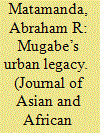| Srl | Item |
| 1 |
ID:
178383


|
|
|
|
|
| Summary/Abstract |
Robert Gabriel Mugabe resigned as the President of Zimbabwe in 2017 after being in office since 1980 when Zimbabwe gained independence from British colonial rule. Mugabe implemented various policies that impacted on the urbanscape of Zimbabwe. Using a desktop approach that is based on bibliography research, the study examines Mugabe’s urban legacy through the lenses of postcolonial theory and the concept of Mugabeism. The results show that power was a dominant feature in Mugabe’s legacy, as he used it to influence the socio-spatial configuration of the urban scape whenever he saw it befitting. His power was rooted in corruption, clientism, patronage, state capture and sanctioning of opponents. Essentially, Mugabe perpetuated the colonial city, in that the postcolonial city was a replication of the socio-spatial segregation which existed during the colonial era, yet this time round it was based on class and not race.
|
|
|
|
|
|
|
|
|
|
|
|
|
|
|
|
| 2 |
ID:
165765


|
|
|
|
|
| Summary/Abstract |
This article uses the case of illegal street vending in Harare to explore the interface between urban governance and politics. Drawing on the ideas of urban governance and informal governance, it illustrates how polarisation between the opposition political party Movement for Democratic Change-dominated municipal council and the Zimbabwe African National Union Patriotic Front-led government is affecting governance in general and in particular Harare municipality’s ability to handle the illegal street vending problem. While the paper essentially identifies political expediency as the major reason why a lasting solution is elusive in handling the illegal street vending problem, it acknowledges that there are broad reasons for its persistence. Consequently, the article demonstrates some of the reasons why illegal street vending is difficult to end using the conventional methods and provides some alternatives.
|
|
|
|
|
|
|
|
|
|
|
|
|
|
|
|
| 3 |
ID:
189284


|
|
|
|
|
| Summary/Abstract |
This study discusses the human security costs and benefits generated by the coronavirus (COVID-19) pandemic-induced state monopoly on the urban public transport system in Zimbabwe through the Zimbabwe United Passenger Company (ZUPCO) since March 2020. Using empirical evidence from Harare, it argues that the ZUPCO initiative had far-reaching safety and security implications on urban residents’ lives during the COVID-19 pandemic. The study found that though the ZUPCO initiative mainly benefited commuters through affordable fares, it had many human security costs. The costs included reduced safety and decreased and unreliable services, which exposed the commuting public to the risk of contracting COVID-19 and other security challenges. The state monopoly on urban transport exacerbated the social and economic impact of COVID-19, promoted inequalities, police corruption and urban residents’ use of informal transport services, which were unsafe and costly. The study concludes that the Zimbabwean government lacks the capacity to provide services in the urban transport sector, akin to nearly every sector in the country. As a stop-gap measure, the government is encouraged to regulate and allow private players to complement its efforts for the benefit, convenience, security, and safety of commuters until it develops an efficient urban public transport system.
|
|
|
|
|
|
|
|
|
|
|
|
|
|
|
|